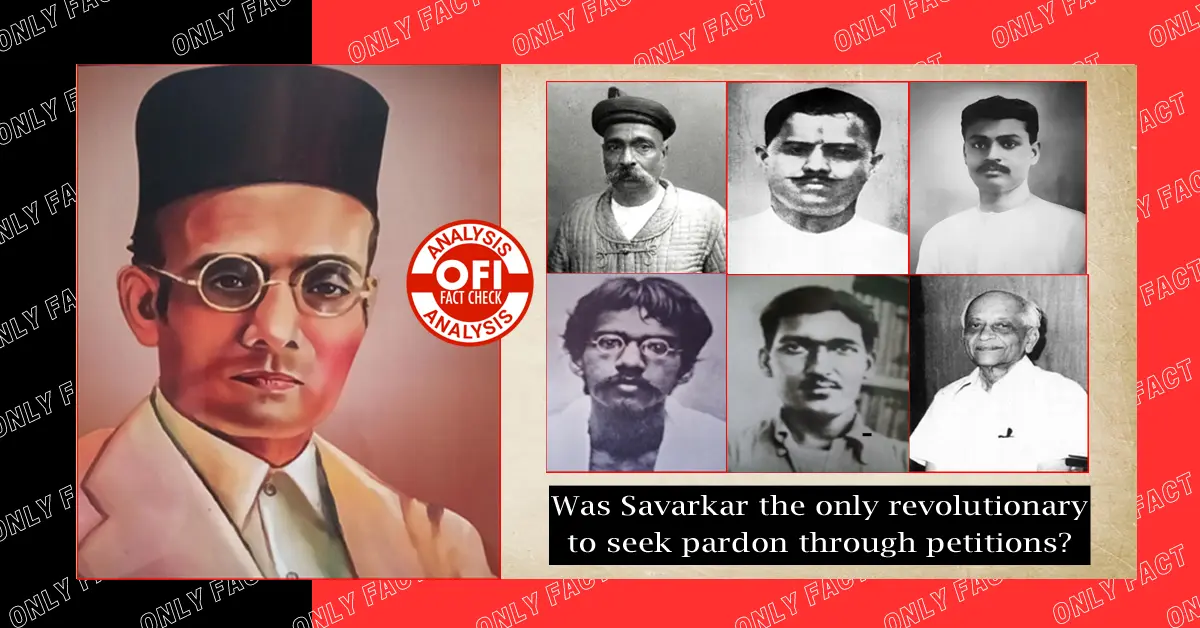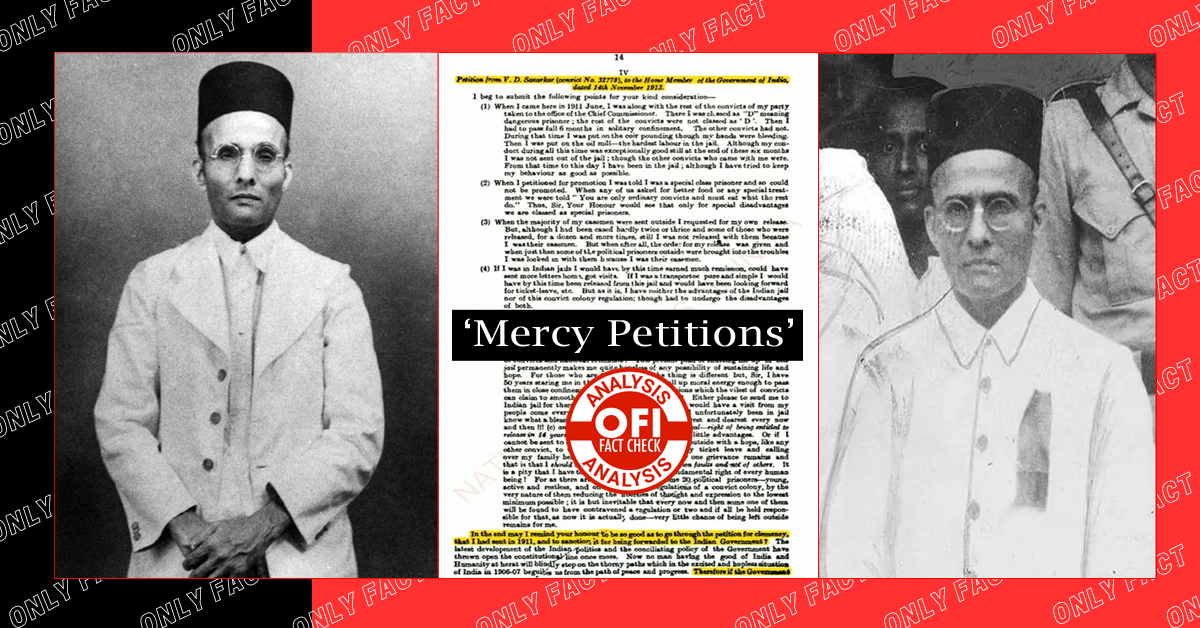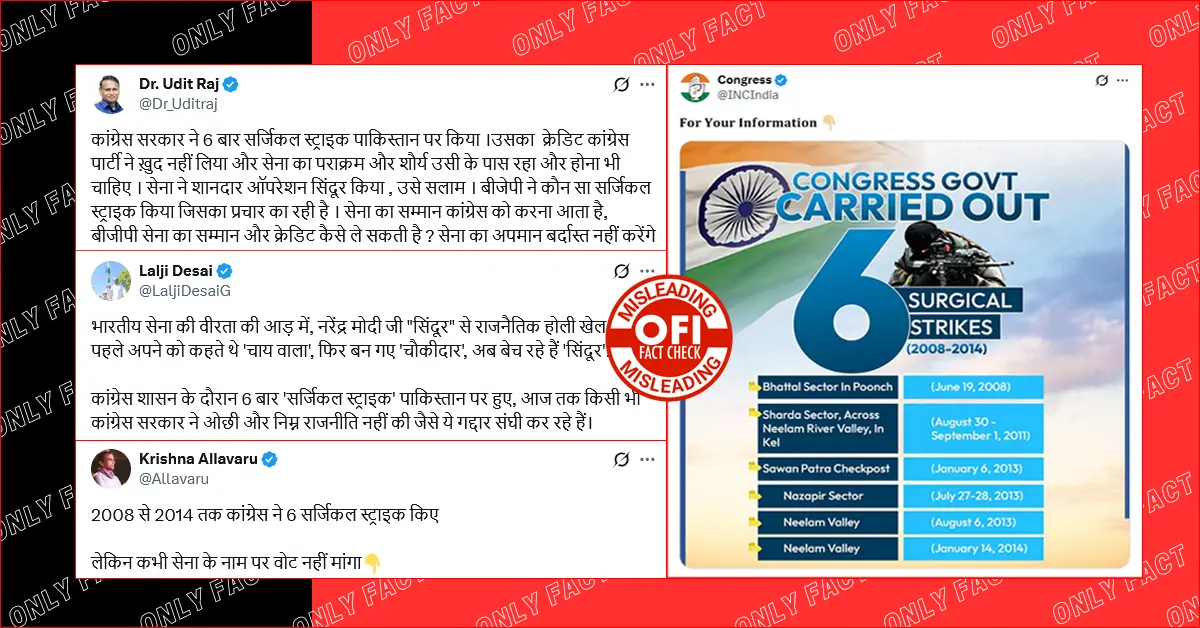Vinayak Damodar Savarkar was a revolutionary, ideologue, and thinker of Hindutva. Although he was a symbol of the revolutionary movement prior to independence, he is now the subject of fierce debate and polarization in present-day Indian politics. He is usually characterized as a ‘traitor’, ‘British collaborator’, or ‘mafi veer’ due to his apology petitions.
You can read Savarkar’s petitions online, but the question is: Was Savarkar alone in seeking pardon or relief from the British government? Did not many of the freedom fighter occasionally write to the British as part of their strategy, submitting petitions? Can history be seen through such simplistic glasses? In the following report, we have provided some of the petitions that have raised questions regarding Vinayak Damodar Savarkar. All the evidence presented in this article is authentic.
Alipore Bomb Case: When Reginald Henry Craddock, the Home Member of the Government of India, visited the Cellular Jail in October 1913, freedom fighters such as Vinayak Damodar Savarkar and the Alipore Bomb Case convicts like Barindra Ghosh, Hrishikesh Kanjilal, Nand Gopal, and Sudhir Kumar Sarkar also submitted their petitions to Craddock.
Hrishikesh Kanjilal authored in his petition that my budget has gone down. I watch many of my comrades die one by one every year. My life here under these conditions is nothing. I am neither regarded as a political prisoner, nor am I treated like a normal prisoner. Instead, I have to undergo all the difficulties of normal prisoners, yet do not receive any facilities like them. An ordinary prisoner is promoted to be a jail warder after a period of time from the beginning of his imprisonment, whereas I, having served a significant portion of my imprisonment, have not as yet been made a jail warder or a petty officer. A common educated prisoner turns into a clerk in an office within three or four months, but I am not even permitted to handle a pen, because handling a pen is a crime here. Sir, it is quite easy here to frame a wrong case against me. I have always conducted myself well outside, but I have been wrongly sent to jail. Hence my humble plea is that please transport me to some jail in India wherein I can receive at least the same amenities that a common prisoner receives. In case the Government cannot transport me to some jail in India, please provide me with the same amenities that are provided in an Indian jail such as permission to read newspapers, letters from family members every four months, and occasional visits. At the moment I do not complain that I am having any medical issues at the moment, because the current Superintendent is a very compassionate and good doctor. But I hear that he will be departing here very soon. How I will be treated in the future I do not know. I very humbly submit my petition of this sort and request you with folded hands to kindly consider it well.
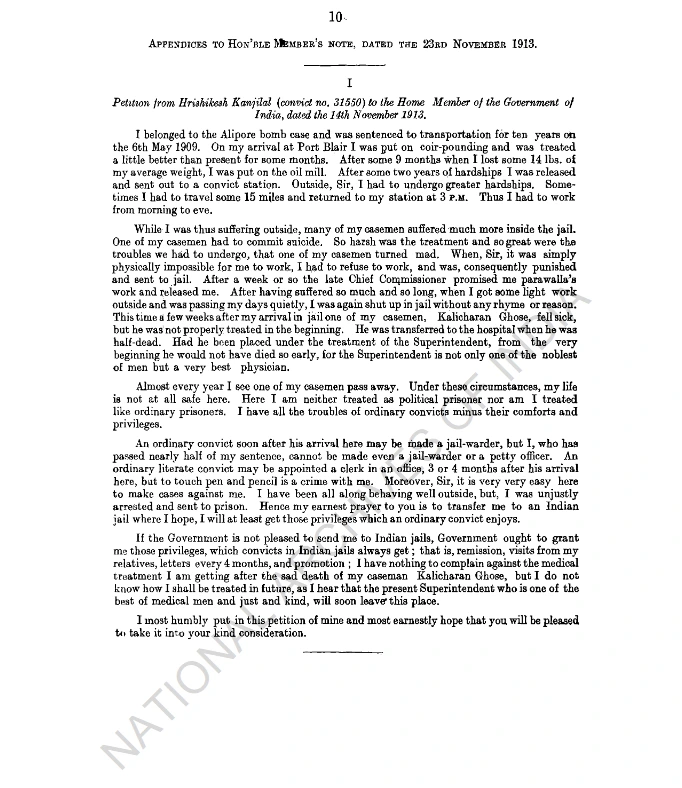
Barindra Ghosh put it in his petition that “I respectfully and humbly submit that the sentence of 20 years of black water imposed upon me is tantamount to a sentence of death for me. My physical health is quite poor – I am a sufferer from a chronic disease of malaria fever and I have never been healthy. As a consequence, my weight has come down to just 92 pounds currently.
Port Blair is an epidemial center of malaria and other ailments, and such natural challenges coupled with the trials and tribulations of this jail life have so run down my health that my premature death is almost certain. Approximately four months back I was attacked by typhoid fever, and my weight at that time had reduced to 80 pounds, and my life was in peril. The extreme care with which my benevolent senior medical officer Captain Murray and Dr. Mandal saved me from the jaws of death.
Apart from this, I have undergone very severely from crude conditions in the Alipore Jail and also in this Jail, a suffering from which no Jail Officer, no matter how sensitive and sympathetic, can emancipate me, unless Your Majesty graciously relieves it. Our expectation of receiving a pardon was great during the time of our most sacred Emperor’s coronation, but it didn’t materialize. Your presence as such an honourable guest has kindled our extinguished hopes.
The autocratic Russian Government has declared a general amnesty to all political prisoners and we have no doubt that our Government, which is in the vanguard of civilisation and culture, will not hesitate to forgive the past errors of some misguided young men like us. I pledge that if it is Your Majesty’s will that I should stay behind, I will stay away from all sorts of agitations and comply with His every command. I can say nothing else in this petition than this. If my appeal is not granted, I pray Your Excellency will graciously send me to some location in India where I will receive improved diet and nutrition than the regulations of this prison. With hope of your benevolence.”
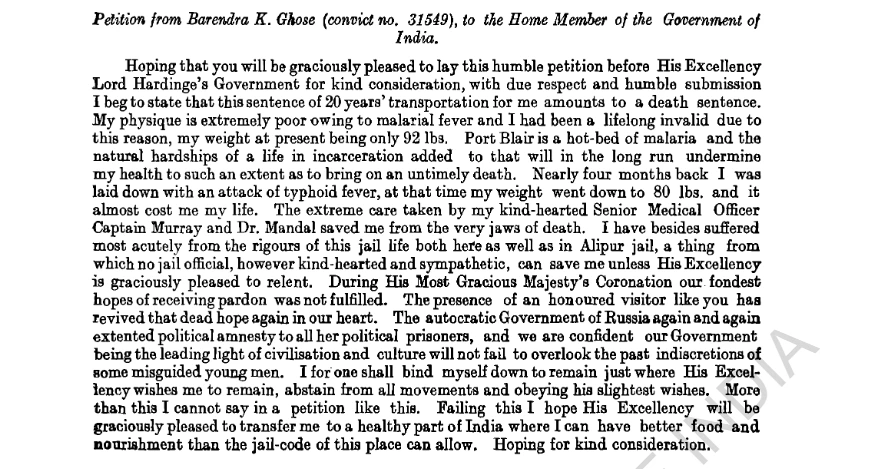
Nand Gopal in his petition stated that we were denied all the amenities that a prisoner receives in an Indian jail. At an Indian jail, a prisoner can see his parents, friends, and relatives twice a year, and can send at least two letters in a year. Once he is made a Convict Night Watcher or Warden, more letters are permitted. He can retain as many books as are dispatched to him. He is not required to undergo hard labour under sun and rain like we do. We are not required to perform even half of the hard labour in Indian prisons. The food we receive is substandard in both quantity and quality. I once registered a complaint to Captain Barker, but he paid no heed. Kindly submit this application of mine to the Viceroy sympathetically.
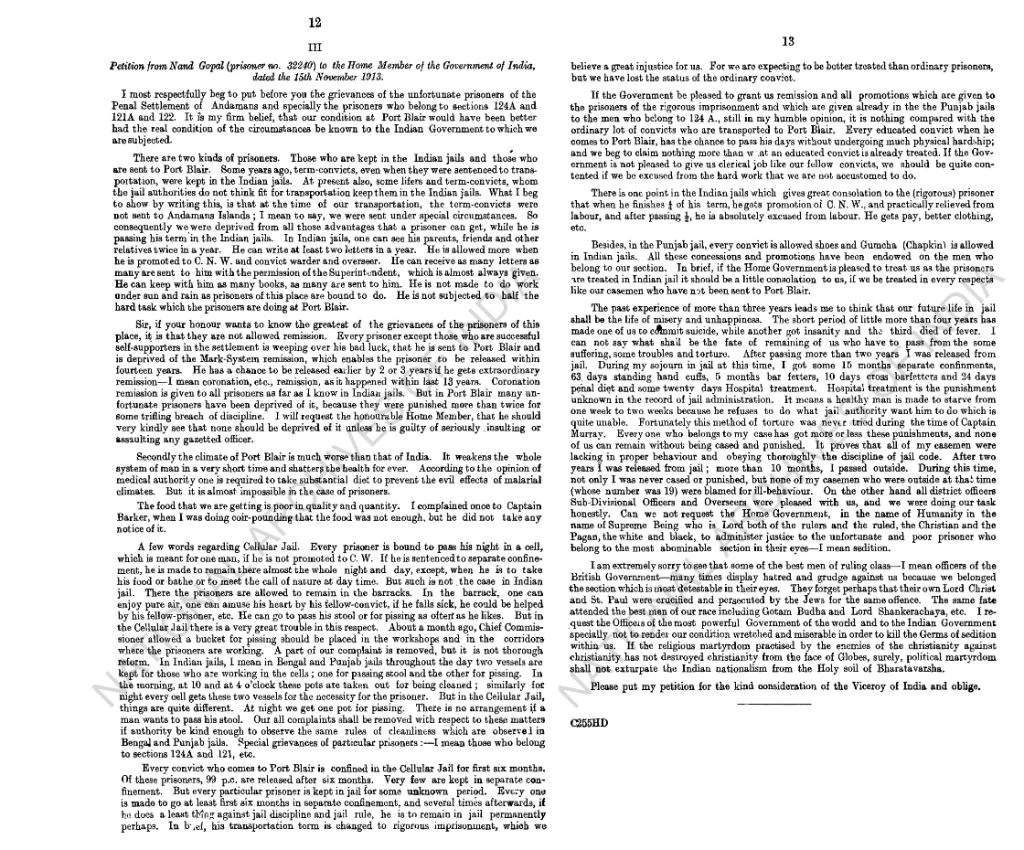
Sudhir Kumar Sarkar penned in his petition that I joined this institution’s literary department so that I might work for the country, unaware that this organization is active in anarchist politics. I appeal to you to be merciful to my current sorrowful situation. I had committed the error of joining an extremist group because I was not mature enough and understanding at the time, which now I have comprehensively realized that it was catastrophic for our country.
Politically, socially, and morally, this group brings a human being to the lowest level. With the growth of my age and awareness, I have been able to realize the distinction between right and wrong. I have served three-fourths of my sentence through good behavior. I want you to include the period in question to my sentence and set me free as early as possible.
I desire to serve my family and nation, acquire more education, and join an agricultural college and serve my poor compatriots by becoming an honest citizen.
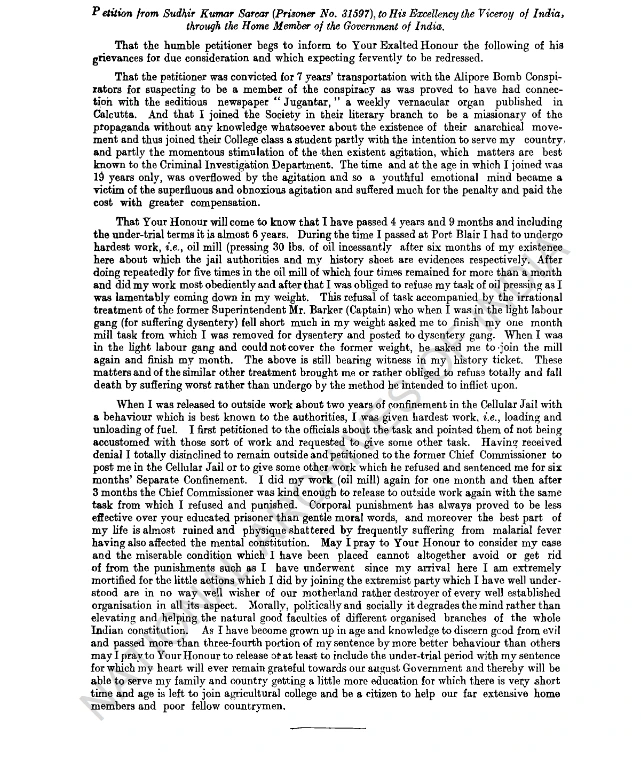
(Source: Read here in National Records)
Benaras Conspiracy Case: The Gadar Party was hatching a plan during the First World War to stage an armed revolt against the British government. Sachindra Nath Sanyal was himself involved in this plot and assisting in organizing the revolt. In 1915, Sanyal had been working with an underground revolutionary organization in Banaras (now known as Varanasi). The British government discovered incriminating evidence against this organization, and he was arrested accordingly. Sachindra Nath Sanyal was imprisoned in Kala Pani (Andaman Nicobar Cellular Jail), for which he was punished with rigorous imprisonment. He was, however, released after a couple of years.
Sachindra Nath Sanyal has written the book ‘Bandi Jeevan‘. In this book, he has expressed his revolutionary life, the time spent in jail and his views on the Indian freedom struggle. In this book, Sachindra Nath has told that he too had filed a petition like Savarkar.
Sachindra describes, “When I was set free from Andaman, Mr. B.C. Chatterjee told me something which I should mention here. I had stated in a letter from Andaman that if the British government seriously provides an opportunity to Indians to do what they believe is best for the well-being of their nation, then why should we dabble with fire through bloodshed through secret conspiracy.” Mr. Chatterjee had told me that the British government will really give us such an opportunity, so now it is your duty to work with a true heart for the reform of Masteghu and abandon the path of secret conspiracy. With this hope and this belief, the government has released you. I had explained that Vinayak Damodar Savarkar had also said the same in his letter as I have said, then why was Savarkar not released and I was released? If what you have said was correct, then Savarkar should also have been released. I think that there are two reasons for my release and the non-release of Savarkar. One is that the public opinion of Bengal had overwhelmingly insisted on the release of political prisoners such as myself. This was the principal motive behind the release of political prisoners. But in Maharashtra, there was not so strong a movement as occurred in Bengal. The second reason behind Savarkar’s release was that following the arrest of Savarkar and his two-four associates, the revolutionary movement in Maharashtra had come to an end. Hence, the government feared that if Savarkar and others were released, the revolutionary struggle would again begin in Maharashtra. Other than this, there was one thing that Savarkar had murdered an Englishman in England. The British government was most annoyed at this. When political prisoners were being released, the government had adopted a policy that the accused who were charged with murder or robbery should not be released. As per this policy too, Savarkar cannot be released, because he was charged with murder.
The remission of Sachindra Nath Sanyal under the Royal Amnesty is also confirmed by the British Government document given below.

(Source: British Government records are available here)
Delhi-Lahore Conspiracy Case: In 1912, a bomb was hurled at Chandni Chowk, Delhi. This bomb was hurled in order to assassinate the then Viceroy, Lord Harding, but Lord Harding managed to survive the attack. This is referred to as the Delhi Conspiracy Case. Master Amir Chand, Bhai Balmukund, Master Avadh Bihari, and Basant Kumar Vishwas were sentenced to be hanged in the Lord Harding bomb case.
In the Delhi Conspiracy Case, Master Amir Chand, Bhai Balmukund, Master Avadh Bihari, Basant Kumar Vishwas had filed an ‘apology’ petition. These amnesty petitions were filed several times.
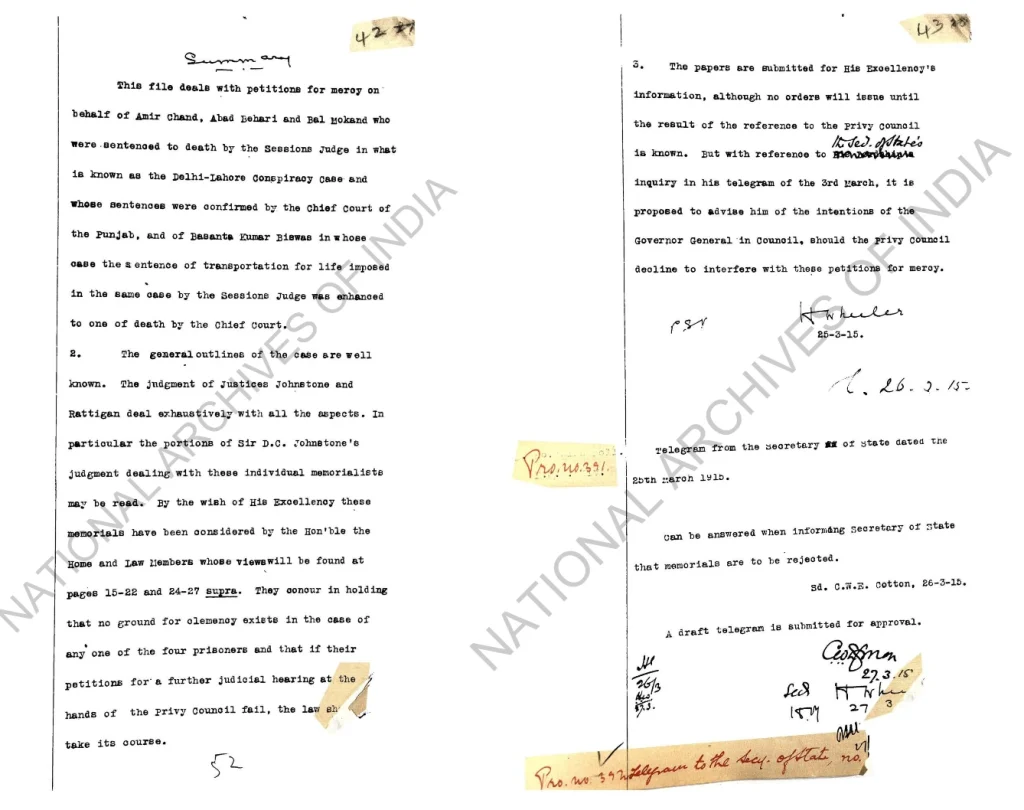
(Source: Government of India’s record regarding the mercy petition can be read online here)
Kakori Incident: Members of the Hindustan Republican Association, Ram Prasad Bismil, Ashfaqulla Khan, Roshan Singh, and Rajendra Lahiri, waylaid a train at Kakori station near Lucknow and robbed the British treasury. This money was required to continue revolutionary activities. Following this incident, the British government jailed several revolutionaries like Bismil. All four revolutionaries were hanged in Gorakhpur Jail on 19 December 1927.
Ram Prasad Bismil penned the book ‘Bismil ki Atmakatha‘ while in Gorakhpur Jail. This autobiography describes his revolutionary life, ideology, struggle, and sacrifice. Ram Prasad Bismil, in this book, has revealed that he and his friends penned petitions to escape hanging.
Ram Prasad Bismil composed in the chapter ‘Aantim Samay Ki Baat’ of this book prior to his hanging, “Today, on 16 December 1927, I am quoting the following lines, whereas the date of hanging this body has been fixed on Monday, 19 December 1927 (Paush Krishna 11, Samvat 1984) at 6 a.m.”
He continued, “Now I think it is proper to relate those things which occurred subsequent to the Sessions Judge giving the verdict regarding the accused of the Kakori conspiracy. The Sessions Judge gave the verdict on 6 April 1927. On 7 July 1927, an appeal was filed in the Avadh Chief Court. In this, the punishments of some were enhanced and those of others were lightened. Prior to the date of appeal, I had written a memorial to the Governor of the United Province, in which I had promised that I would in no way have any connection with the revolutionary party in the future. I had referred to this memorial in my previous mercy petition written and sent to the judges of the Chief Court. But the judges of the Chief Court paid no heed to any of my requests. I myself composed the arguments of my case from the jail and ordered them to be printed. As soon as the judges of the Chief Court heard this argument, they were in great doubt that I did not write this argument. The outcome of all these things was that I was declared by the Chief Court of Avadh as a very dangerous conspirator. The judges did not trust my repentance and showed their view in this manner that if he (Ramprasad) was released, he would repeat the same act again. Shedding light on my sharpness of understanding and intellect, I was bestowed with the title of ‘merciless murderer’. The pen was in his hand, he might have written anything he liked, but listening to the Chief Court’s verdict on the Kakori conspiracy from start to finish, it is easy to understand why I was sentenced to death. It was concluded that Ramprasad had uttered abusive words against the Sessions Judge, had slandered the intelligence department workers, i.e., had raised his voice against the injustice taking place during the time of the trial. Thus, Ramprasad is the most impudent accused. Now, regardless of whatever he requests for forgiveness, it cannot be granted.”
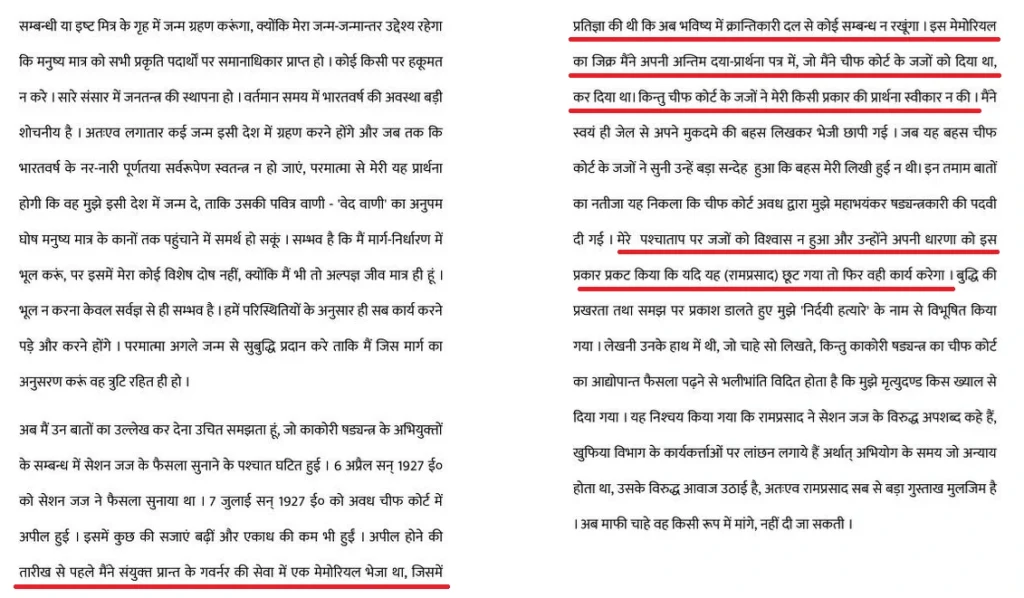
Ramprasad Bismil did write in the book, “After rejecting the appeal of the Chief Court, according to the rules, a mercy petition was submitted to the Provincial Governor and then to the Viceroy. Nearly all the elected members of the Council of the United Province signed a petition suggesting that the death penalty of Ramprasad Bismil, Rajendranath Lahiri, Roshan Singh, and Ashfaqulla Khan be substituted with some other form of punishment.” My father forwarded an independent petition signed by 250 landlords, honorary magistrates, and nobles, but Sir William Morris’s government didn’t heed a single one of them! Simultaneously, 78 members of the Legislative Assembly and Council of State brought a petition and forwarded it to the Viceroy, requesting that the death penalty of those convicted under the Kakori conspiracy be replaced by some other penalty, because the visiting judge had suggested that if these individuals changed their minds, the government must inflict less punishment. All four accused had shown remorse. But the Viceroy paid no heed to any of them.
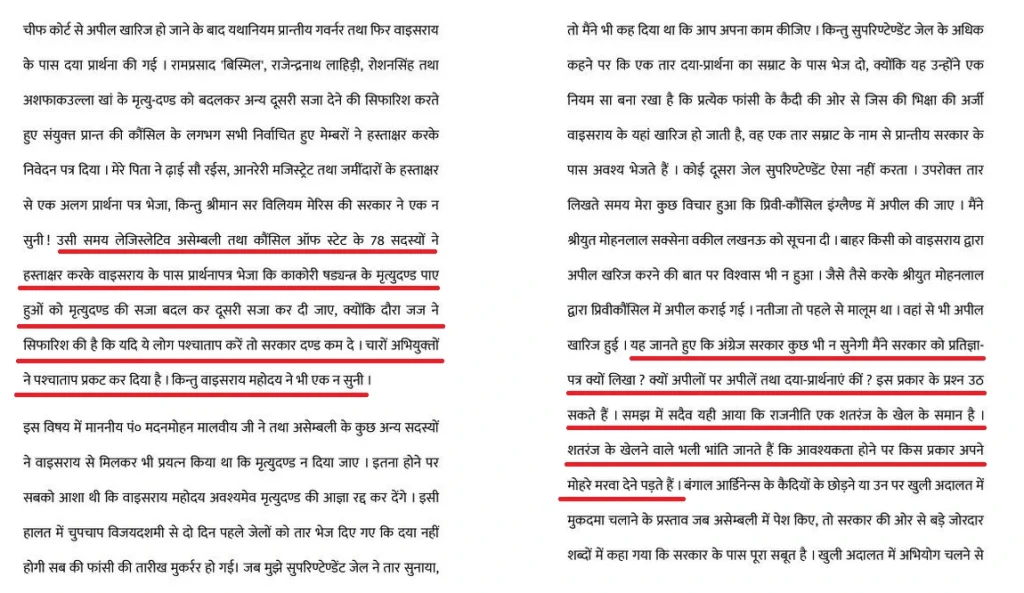
Ramprasad Bismil wrote in his book further, “Respected Pandit Madan Mohan Malviya ji and some other members of the Assembly had tried to meet the Viceroy and ensure that the death penalty was not awarded. After this, everyone had hopes that the Viceroy would definitely withdraw the death penalty order.” In this context, two days prior to Vijayadashami, telegrams were quietly dispatched to the prisons stating that there would be no leniency and the hanging date of all was decided. When the Jail Superintendent read out the telegram to me, I also instructed him to do his job. But at the request of the Superintendent of Jail, I agreed to send a telegram to the Emperor seeking mercy, because he had made a rule that on behalf of each prisoner to be hanged, whose mercy petition is rejected by the Viceroy, he should send a telegram in the name of the Emperor to the Provincial Government. No other Jail Superintendent does this. While composing the above telegram, I considered submitting an appeal to the Privy Council of England.
I sent word to Mr. Mohanlal Saxena, lawyer, Lucknow. No outsider was convinced that the Viceroy would turn down the appeal. Somehow or other, Mr. Mohanlal submitted an appeal to the Privy Council. The outcome was known already. The appeal was turned down even from there. Since I knew that the British Government would never hear anything out, why did I prepare an affidavit to the government? Why did I submit appeals upon appeals and beg for mercy? Such questions may be raised. I always knew politics was a game of chess. The chess players are well aware of the way they have to arrange for their pawns to be killed when necessary.
Ramprasad Prasad also penned, “Mr. Ashfaqulla Khan was not willing to pray to the British government for mercy. He had a strong belief that one should never pray to anybody except the forgiving God, but it was only on my special insistence that he prayed to the government for mercy.” I am the person who utilized the divine rights of my beloved in order to deter Mr. Ashfaqulla Khan from his strong determination. I apologized for my fault in a letter and sent it from Gorakhpur jail on Brother’s Day and begged for forgiveness. God alone knows whether that letter reached him or not. Anyway! It was God’s will that we would be hanged, salt would be applied to the scorched hearts of the Indians, they would suffer, and our souls would be joyful in seeing His work. When we are ready to acquire a new body and help in the country’s service, the political condition of India should be fully changed. Most of the common people should be secure. The rural folks too should begin realizing their responsibilities.
(Source: Petitions are mentioned here also in the National Records)
Sachindra Nath Sanyal’s name also came up in the Kakori case, due to which he was once again sentenced to Kalapaani in the year 1925. He was released from jail in the year 1937 but he remained under house arrest till the last days of his life. Later he died of TB.
Sachindra, in a letter to the Home Member of the Government of India on 18 March 1941, wrote that after his release from jail he had kept away entirely from politics. He did not even get acquainted with the old revolutionaries, other than those who incidentally met him. He took care not to indulge in any political work, so that the police might not be able to trouble him. When the Second World War broke out, he was not involved in political work at all. However, he was detained and jailed for no obvious reason. Initially, he was detained at Delhi Camp, where his family members had no facility. He was not even able to write to his wife and children, and if at all he was able to send anything, he was not allowed to use the Bengali language. His friends sent the Bengali books also, which the British government confiscated. He requested the government to release him. He stated that if he was not released immediately, his health would decline totally and he would die. He also stated that he had no relation to political work, so he must be released.
Sachindra Nath Sanyal wrote another letter on 19 March 1941. He appealed to the Indian government for justice and called his arrest unfair and unjust. Sachindra gave the example of concentration camps in Germany (Nazi torture camps) and said that even there the prisoners were released after a certain time but in India the government was not doing anything.
(Source: Read here in National Records)
Bolshevik Conspiracy Case: Shripad Amrit Dange was a co-founder of the Communist Party of India. In 1924, during British rule, the British government convicted him to a term of 13 years of imprisonment for communist and trade union work. Nalini Bhushan Das Gupta, Shaukat Usman, Muzaffar Ahmed, and Singaravelu Chettiar were also convicted in this case.
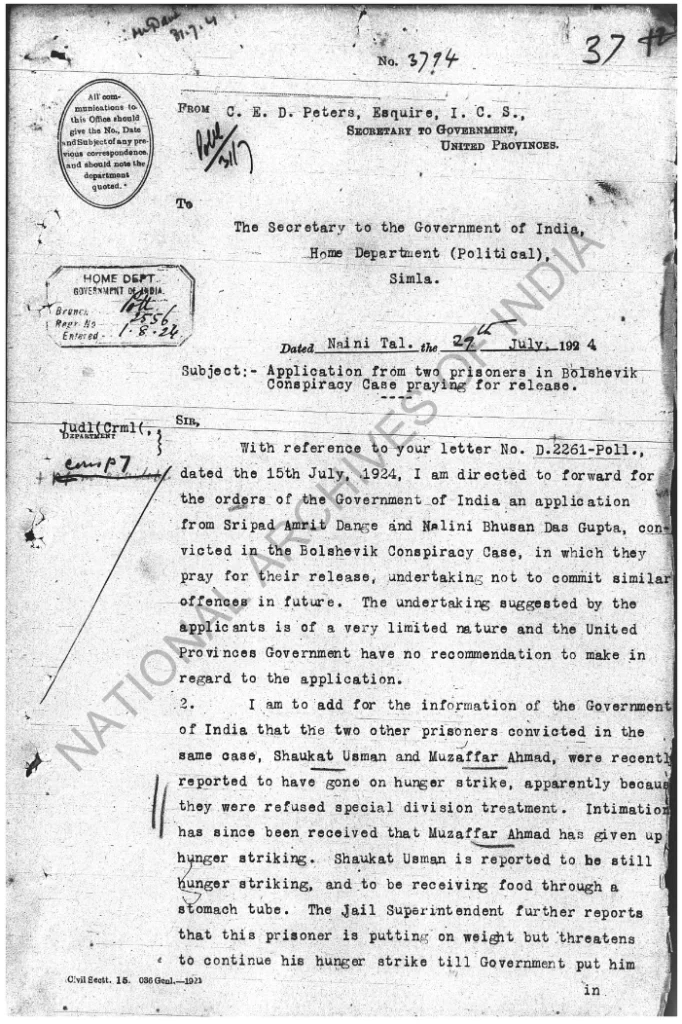
In this punishment, Shripad Amrit Dange and Nalini Bhushan Das Gupta presented a pardon petition to the British government. In it, both of them promised the British that they would never commit any sort of crime in the future. They would be thankful if provision is made for their release. Likewise, petitions were presented by Shaukat Usman, Muzaffar Ahmed, and Singaravelu Chettiar.
(Source: Available in National Records here)
Bipin Chandra Pal: The Home Department Secretary forwarded a report to India in October 1911 on the political condition of Bengal. In this report, Bipin Chandra Pal, one of the Lal-Bal-Pal trinity (Lala Lajpat Rai, Bal Gangadhar Tilak, and Bipin Chandra Pal) of the Indian Independence Movement, informed the court that he was withdrawing from politics. Bipin Chandra Pal’s appeal for mercy was received with a mixed reaction by the Bengali press.
(Source: Read on page number 4 in National Records)
Subrahmanya Bharati: Poet and freedom fighter Subrahmanya Bharati penned a mercy petition to the British Governor Lord Pentland on 28 November 1918. In it, he wrote: “I was arrested at Cuddalore while I was traveling from Pondicherry to my native district, Tirunelveli. At your leave, I had given earnest assurances several times earlier, as you will recall. Some time back, your Government sent the Deputy Inspector General (C.I.D.) to interview me at Pondicherry. The DIG was pleased with my attitude towards the British Government and inquired if I would be willing to be interned in just two districts during the war. I turned down that proposal since I had totally retired from politics and did not think that any sort of restriction upon me was required. Even afterward, I presented various petitions wherein I made my stand clear. I reiterate again that I have renounced all types of politics. I will always remain devoted to the British government and an obedient citizen. Hence, I respectfully request you with folded hands to release me at once. God bless you with a long and prosperous life.”
(Read Subramanya Bharati’s petition from page 45 in Tamil language book)
Bal Gangadhar Tilak: On 30 April 1908, Judge Kingsford was attacked by Khudiram Bose and Prafulla Chandra Chaki, who hurled a bomb. Two British ladies lost their lives in this incident. The British arrested Khudiram Bose and brought him to trial. Following this arrest, Bal Gangadhar Tilak published an article in his newspaper Kesari in support of the revolutionaries. This piece of writing upset the British. Tilak was arrested on 3 July 1908 and sentenced to six years of imprisonment. He was jailed in Mandalay Jail, Burma.
Bal Gangadhar Tilak, in his petition of October 1912, prayed for remission or relief of the remaining portion of his six years of simple imprisonment. He also pointed out that several prisoners had been granted relief amounting to one-third of their term. Tilak testified in his petition that on three special occasions, the 50th anniversary of the Proclamation of Queen Victoria, the coronation of the King on the throne, and the coronation of the Emperor of India, provision was made for remission of sentences for prisoners. However, because of his last two convictions, he was denied this benefit. He appealed that if the whole sentence could not be remitted, then at least some relief should be provided on the grounds of good conduct.
(Source: Read on page number 278-280 of History of the Freedom Movement in India)
Mercy Petitions of Bhagat Singh, Sukhdev, and Rajguru: In 1928, Lala Lajpat Rai organized a demonstration against the Simon Commission. While taking part in the demonstration, the police lathi-charged him, during which he suffered a serious injury and died a few days later. To avenge the death of Lala Lajpat Rai, Bhagat Singh, Rajguru, Sukhdev, and others collectively murdered British police officer John Saunders. While they had intended to murder Scott, Saunders was accidentally shot. The three young men were sentenced to death by the British government on 23 March 1931
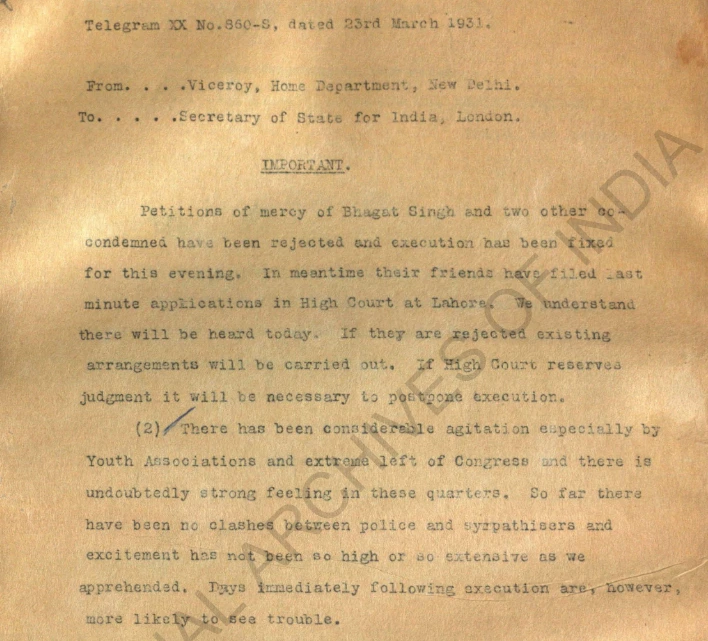
The Viceroy, Home Department, Government of India, telegraphed on 23 March 1931 that Bhagat Singh and the other two individuals to be executed have had their mercy petitions refused and their execution has been scheduled for this evening. Meanwhile, their acquaintances have made last-minute appeals in the Lahore High Court, which are likely to be heard today. If such petitions are dismissed, the execution will be carried out according to the pre-arranged plan. If the High Court keeps the decision pending, the execution will have to be deferred.
A General Call for the Release of Prisoners: A general call for the release of political prisoners who were housed in Andaman was made throughout India. The National Union of Bombay had a petition calling for their release. The petition had approximately 70,000 signers. Nevertheless, the prime motivation that induced the Government of India to declare a general amnesty for the political prisoners was the purpose of making way for the enforcement of the new reforms promulgated under the Government of India Act, 1919. Due to this move, 120 of the 150 prisoners were released or sent to Indian jails. There were only 30 prisoners left behind in Andaman. At release, all political prisoners were compelled to sign that they would avoid politics and revolutionary work for a number of years. If they were later convicted again of treason, they would be returned to Andaman to complete the remaining sentence there. In the beginning, all the political prisoners were averse to signing the pledge, but because of advice and persuasion on the part of the moderate section, particularly by Savarkar, they finally acquiesced.
(Source: Read from page number 102 in ‘Kala Pani History of Andaman & Nicobar Islands, with a Study of India’s Freedom Struggle’)
Demand for Release of Andaman Prisoners in April 1936: In April 1936, the Government of India’s Home Secretary, Sir Henry Crack, was dispatched on an urgent tour to Andaman. In their memorandum, the prisoners made a demand for the release of all political prisoners who were housed in the Cellular Jail and the abolition of all repressive legislation and regulations imposed upon them. They also said that these demands were the voice of the people. They underlined the harsh conditions of captivity in the Cellular Jail and requested the establishment of a distinct category for political prisoners in their memorandum. Amenities such as a daily allowance, access to books and newspapers, permission to purchase books, sitting facilities, opportunities for exercise and reading, and proper clothing were also requested.
(Source: Read on page number 115 in ‘Kala Pani History of Andaman & Nicobar Islands, with a Study of India’s Freedom Struggle’)
Bagh Ali Khan: Bagh, who was a prisoner in Andaman, requested his release in a petition in 1940. He pleaded and stated that if he is released, he shall pray for long life and prosperity to the one who accepts the petition. Bagh also stated that he is innocent and never took part in any crime.
Peer Mehboob Shah: Peer Mehboob Shah was given a two-year sentence in a speech case. He began a hunger strike in prison. The British government treated Peer Mehboob Shah’s hunger strike as a political test. Mehboob acceded to the terms of the British government and apologized for his speech. He was released after this.
(Source: In this regard, the British government document contains details of Pir Mehboob Shah’s hunger strike, arrest and the subsequent legal proceedings)
Sohan Singh, Ganga Singh, and Sadhu Singh: Sohan Singh, Ganga Singh, and Sadhu Singh were given the death sentence under the ‘Enemy Agents Ordinance’ for anti-British activities. In December 1944, all three of them professed loyalty to the British government in their petition. The petitioner apologized humbly and unconditionally and promised that he would observe good conduct in the future. He conveyed his loyalty and allegiance to the British government and added that the plight of his wife and children should also be taken into consideration. Following this petition, the death penalty was altered to life-long exile.
(Source: You can read it here in the records of Government of India)
Your most obedient servant: Vinayak Damodar Savarkar is blamed for having signed “I beg to remain, Sir, Your most obedient servant” at the end of his petitions to the British government. Congress MP Rahul Gandhi stated in a press conference that Savarkar had written a letter to the British quoting, “Sir, I want to be your servant.” Rahul Gandhi also displayed Savarkar’s letter to the British. He told me that this is the most crucial document for me. It has Savarkar’s letter in which he wrote to the British, “Sir, I want to remain your servant.” Savarkar cooperated with the British.
D. O’Flynn, Deputy Secretary of the Home Department of the Government of Bombay, wrote a letter to Vinayak Damodar Savarkar on 6th May 1926. In this letter, D. O’Flynn informed him that one of his articles published in Shraddhanand contravenes the terms of release. This is against his oath in which he had expressed that he would not take part in any type of political activity without the government’s consent. Thus, I request you to desist from releasing such sensitive articles in the future.
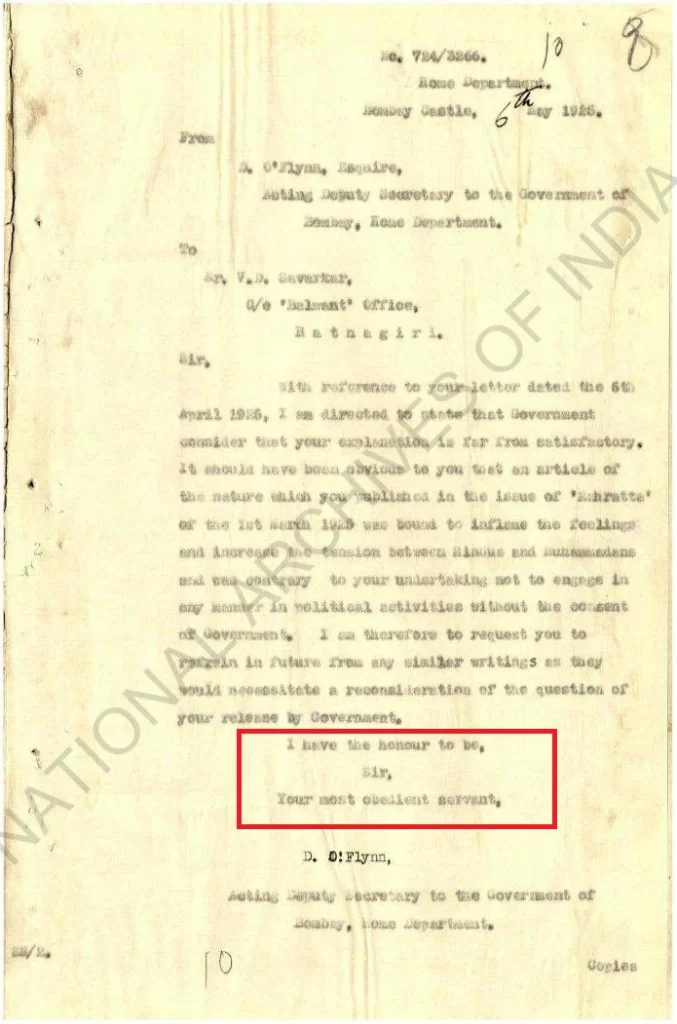
The noteworthy thing in this letter is that at the end of the letter D. O’ Flynn has written, ‘I have the honour to be, Sir, Your most obedient servant’.
Mahatma Gandhi penned a letter to the Viceroy (Governor-General of British India) on 29 April 1918. In the letter, Gandhi declared that, “I will not attend the conference on the 26th, as I declared in my previous letter. But due to the interview you have graciously given me subsequently, I have accepted the invitation, if only for the great regard and affection which I bear towards you. One of the causes of my not being present at the conference, and even the main one, was that powerful mass leaders such as Mr. Tilak, Mrs. Besant and the Ali brothers were not extended an invitation to the conference. I still believe that it was a grave error not to invite them, and I respectfully propose that this blunder can be partly made up if these leaders are invited to guide the provincial conferences which are to be organized in the future.”
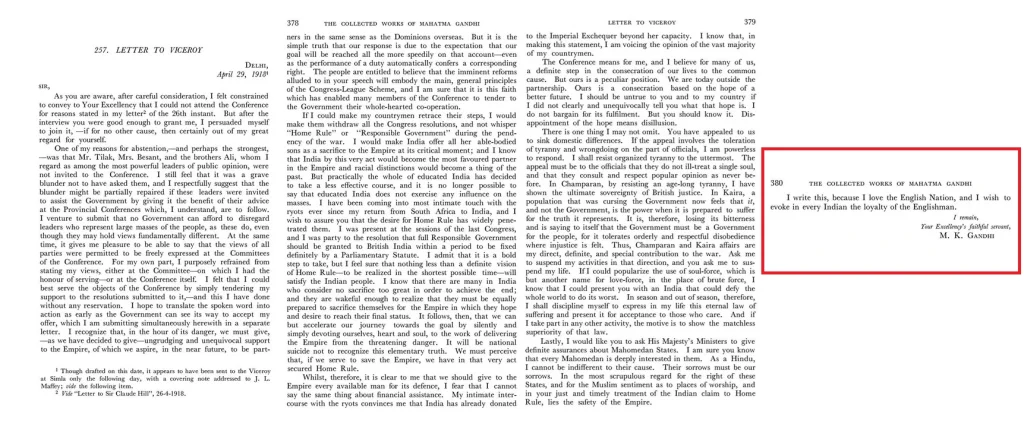
Gandhi also stated further, “I desire Your Excellency to provide categorical assurances in respect of the Muslim states. I do believe you are aware of the fact that all Hindus feel the Muslims’ suffering keenly. As a Hindu, I am unable to remain unmoved in respect of their sufferings. I and the Muslims equally respect the holy places of these states, and I hope from the Indian perspective that it will be settled in due and proper time which will consolidate the Home Rule spirit.”
At the close of the same letter, Gandhi penned, “I am writing this because I love the British nation, and want that loyalty towards the British should be awakened in every Indian.
Your loyal servant, M.K. Gandhi.
(Source: The Collected Works of Mahatma Gandhi, Vol. 14, page 377-380)
Mahatma Gandhi wrote a letter to Lord Ampthill (Governor of Madras from October 1900 to February 1906 and Acting Viceroy of India from April to December 1904) on 21 July 1909. Gandhi ended the letter with the words ‘I humbly remain, your obedient servant‘.
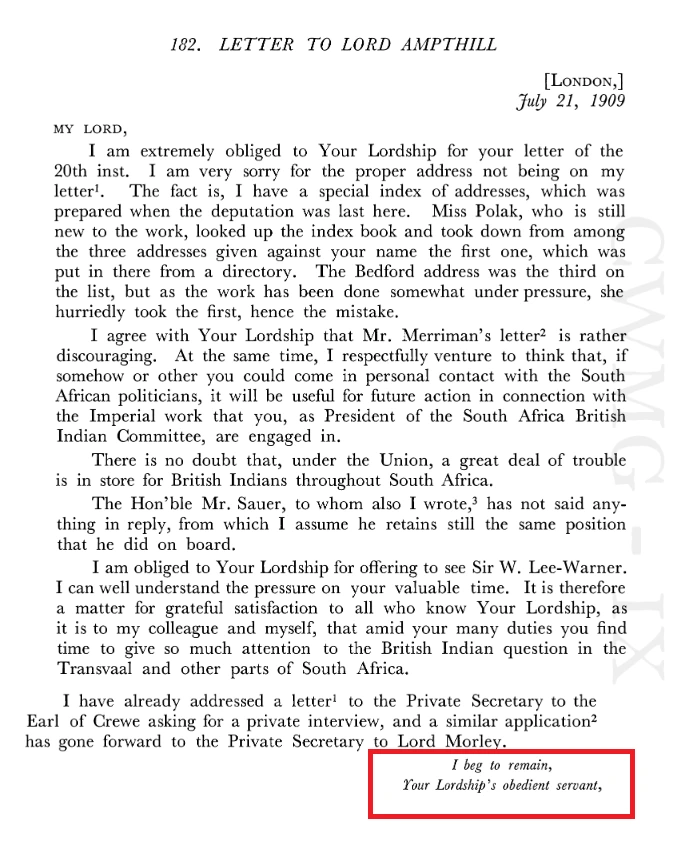
(Source: The Collected Works of Mahatma Gandhi)
Letter of D. O. Flynn, Deputy Secretary of Home Department of Government of Bombay to Vinayak Savarkar, or letter of Mahatma Gandhi to the Viceroy: At the end of both these letters, “obedient servant” was written. So, should it be assumed that the British officers were servants of Savarkar or that Mahatma Gandhi was a servant of the British? No. Indeed, if we examine the epistolary style of that time, we must bear in mind that phrases such as “Obedient Servant” or “Your Most Obedient Servant” were nothing more than courtesy expressions and were a part of British administrative and colonial bureaucratic jargon. Accepting their literal interpretation and inferring that the person was one’s “servant” would be taking an ahistorical stand.
Also Read: Analyzing What the British Really Thought of Savarkar’s Mercy Petitions

